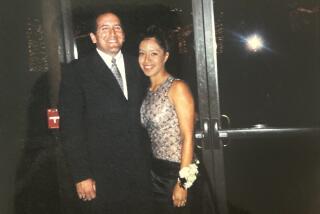Yagman Indicted by Federal Grand Jury
- Share via
Civil rights attorney Stephen Yagman, whose long career challenging police brutality has occasionally been derailed by run-ins with the State Bar and several federal judges, was indicted Friday on charges of income tax evasion, bankruptcy fraud and money laundering.
A 19-count indictment, returned by a federal grand jury on June 1, was unsealed a day after Yagman, 61, finished defending a woman charged with a methamphetamine offense in Riverside County.
The U.S. attorney’s office would not say what prompted officials to launch an investigation that spanned five years and centered on a tax liability totaling $158,000.
Asserting that federal charges are rare for the conduct alleged in the 58-page indictment, defense lawyer Barry Tarlow accused the government of retaliating for “successful battles” Yagman had waged against two of the agencies that investigated him. Tarlow said Yagman had won a $650,000 judgment against the Internal Revenue Service.
Tarlow noted that the indictment had been approved by Justice Department officials in Washington.
Thom Mrozek, spokesman for the U.S. attorney’s office in Los Angeles, said prosecutors “vehemently deny that this case is motivated by political retribution or any other improper motive.”
“The charges are detailed in the indictment, and we intend to litigate those charges in court.”
Yagman, who was admitted to the California Bar in 1976, has loomed like a self-appointed avenging angel over the city’s power establishment, particularly in the police and judicial systems, for more than a quarter of a century. He pursued a string of successful abuse cases against the Los Angeles Police Department and other law enforcement agencies and pioneered the tactic of calling the city’s top elected officials to the witness stand to answer for the actions of rank-and-file police officers.
He also broke legal ground by holding City Council members personally liable for damages stemming from the actions of bad cops.
Among his many high-profile cases were those against the LAPD’s secretive SIS unit. Formed in 1965 by then-Chief William Parker to coordinate surveillance against criminal suspects, the unit has been involved in more than 50 gun battles and the deaths of at least 37 suspects. Yagman has frequently referred to the unit as a death squad.
He once persuaded a jury to hold former Police Chief Daryl Gates and other officers liable for the deaths of robbers shot by the SIS outside a McDonald’s in Sunland.
In 2002, Yagman filed one of the first federal suits challenging the Bush administration’s policy of imprisoning terrorist suspects at Guantanamo Bay, Cuba, to keep them beyond the reach of U.S. legal protections.
Yagman is also known for launching intemperate verbal fusillades against officials he went up against. He once referred to Mayor Tom Bradley as an “Uncle Tom” and called Gates “the personification of evil.”
Some of these attacks have gotten him into serious trouble, although he has never before faced criminal charges. In 1994, a special disciplinary committee of the U.S. District Court in Los Angeles suspended him from practicing in the federal courts for two years for accusing U.S. District Judge William D. Keller of being anti-Semitic. Yagman also called Keller “dishonest ... a bully and one of the worst judges in the United States.”
A hundred local lawyers rallied to Yagman’s support, and a year later, the U.S. 9th Circuit Court of Appeals overturned the suspension, saying it violated the attorney’s 1st Amendment rights.
Yagman also was suspended by the California State Bar twice for charging clients “unconscionable” fees.
Over the last several years, Yagman has waged a campaign to have U.S. District Judge Manuel L. Real disciplined for his unusual intervention in a bankruptcy case in which Yagman had no involvement.
That case has drawn widespread attention in judicial circles, and Yagman is scheduled to testify next Thursday at a House judiciary subcommittee hearing on judicial discipline procedures.
After initially dismissing Yagman’s claims against Real, Mary Schroeder, chief judge of the U.S. 9th Circuit, has appointed a special committee to investigate the charges.
Loyola Law School professor Laurie Levenson said Yagman “painted a target on himself by the nature of his practice and the manner in which he practiced: extremely aggressive, very personal, enjoying the fight. Now he is on the opposite end of it.”
The indictment unveiled Friday charges Yagman with one count of attempting to evade paying his taxes, one count of bankruptcy fraud and 17 counts of money laundering. If convicted, Yagman faces five years in prison on each of the tax evasion and bankruptcy fraud counts. The money laundering counts each carry a maximum statutory penalty of 10 years in federal prison.
The indictment details an elaborate set of transactions that government officials contend Yagman designed to conceal his assets and evade a tax bill of $158,000.
Rather than paying what he owed, the indictment charges, Yagman deposited and disguised personal funds in bank and brokerage accounts held in his girlfriend’s name. The funds included $776,000 transferred to him by “elderly relatives” and thousands of dollars in legal settlements and payments from clients that he received in 1999 and 2000, the government says.
“Mr. Yagman’s pattern of deception and illegal conduct, as alleged in this indictment, discredits those who practice law,” said Kenneth J. Hines, special agent in charge of IRS Criminal Investigation, Los Angeles field office, in a prepared statement.
According to the indictment, Yagman filed bankruptcies in Los Angeles and New York, claiming he had moved to New York while failing to disclose that he actually lived in, made mortgage payments on and took deductions for a 2,800-square-foot house near the beach in Venice.
Yagman said he has long owned an apartment in New York, holds a New York driver’s license and is registered to vote there.
Tarlow said Yagman is “an innocent man wrongly accused.” As evidence of the government’s animosity, he pointed to an agreement the U.S. attorney’s office reached granting early release to a former Yagman client, Michael Colello, who was convicted of fraud and perjury charges, to testify against the lawyer.
Yagman in 2004 filed a civil suit accusing U.S. Atty. Debra Yang; Alka Sagar, the lead prosecutor on the criminal case; three other prosecutors; and two federal agents of violating his rights by leaking news of his investigation to the Los Angeles Daily Journal, a legal newspaper, the year before. Yagman said authorities acted to disrupt two civil rights lawsuits he had filed against federal officials. They have denied the charges.
Yagman surrendered Friday by prearrangement to federal marshals and was briefly taken into custody. He arrived in court hours later, wearing a pink polo shirt, khakis and a pair of handcuffs and was arraigned and released on $100,000 bail.
During the brief hearing, prosecutor Sagar said she was opposed to Yagman’s being permitted to leave the country. Defense lawyer Mark Heaney, Tarlow’s partner, said Yagman had been aware of the investigation for some time “and has not done anything to suggest that he would leave the country.” At another point, Heaney said, “Stephen Yagman is a fighter ... not a guy who runs away.”
U.S. Magistrate Patrick J. Walsh ordered Yagman to surrender his passport and told him he had to notify federal Pretrial Services whenever he planned to leave the state.
Yagman said little during the hearing, answering “Yes” when Walsh asked him if he had seen and understood the indictment. As the proceedings ended, he told the judge, “Thank you.”
Times staff writer Ashley Surdin contributed to this report.
More to Read
Sign up for Essential California
The most important California stories and recommendations in your inbox every morning.
You may occasionally receive promotional content from the Los Angeles Times.













